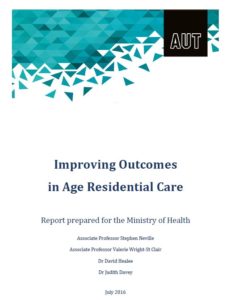 In 2002 the Ministry of Health introduced an external certification and audit process for aged residential care (rest home) facilities. The aim of certification and audit is to ensure that all older people receive acceptable aged residential care that meets quality and safety standards set under the relevant health laws and regulations. The results from certification audits are published online and the practice of unannounced “spot-audits” is now routine in the sector.
In 2002 the Ministry of Health introduced an external certification and audit process for aged residential care (rest home) facilities. The aim of certification and audit is to ensure that all older people receive acceptable aged residential care that meets quality and safety standards set under the relevant health laws and regulations. The results from certification audits are published online and the practice of unannounced “spot-audits” is now routine in the sector.
An independent review by Auckland University of Technology (AUT) of the impact of these changes was commissioned by the Ministry to ask the question ‘Have all these changes to auditing and certification actually improved outcomes for older people living in aged residential care facilities?’ The evaluation concluded that overall there has been a positive impact of the integrated audit at all levels of the age residential care sector and that providers are committed to providing safe and high quality care.
Achieving a longer certification period (maximum of 4 years) is highly regarded by facilities and seen as demonstrating organisations’ commitment to quality and improved outcomes for people living in age residential care. Over the six years between 2009 and 2015 an increased number of facilities achieved 4-year certification (the report does not include details of the actual numbers involved) as well as lower numbers of partial achievement scores.
In general there is a sense of that improvements in the audit process have led to improved communication between stakeholders. Combining DHB contract and certification audits as well as auditors approaching audits as a collaborative, quality-focused conversation, rather than a data-focused examination were seen as the best way to improve outcomes for older people.
Publishing reports online is proving to be useful and used by a wide variety of those involved in the sector. Consumers, job-seekers and other aged care facilities all refer to them and the AUT report says that a link could be made to improving outcomes for older people as a result.
Have actual outcomes for older people improved?
The review report lacks much in the way of outcomes data to demonstrate improved outcomes for older people. No direct relationship was found between satisfaction surveys and the changes to the audit process. DHBs and advocacy groups did however report a downward trend in complaints from consumers which may be attributable to better complaints management processes required under the certification audits. Stakeholders surveyed for the review felt that the focus on continuous improvement, improved staff education and more clinical support and in-service training through DHBs is contributing to better outcomes.
Not surprisingly, the AUT report concludes that further research is needed with the people living in aged residential care facilities to determine whether care provided promotes wellbeing and improved outcomes.
Read the report on the Ministry of Health website: www.health.govt.nz/publication/improving-outcomes-age-residential-care
